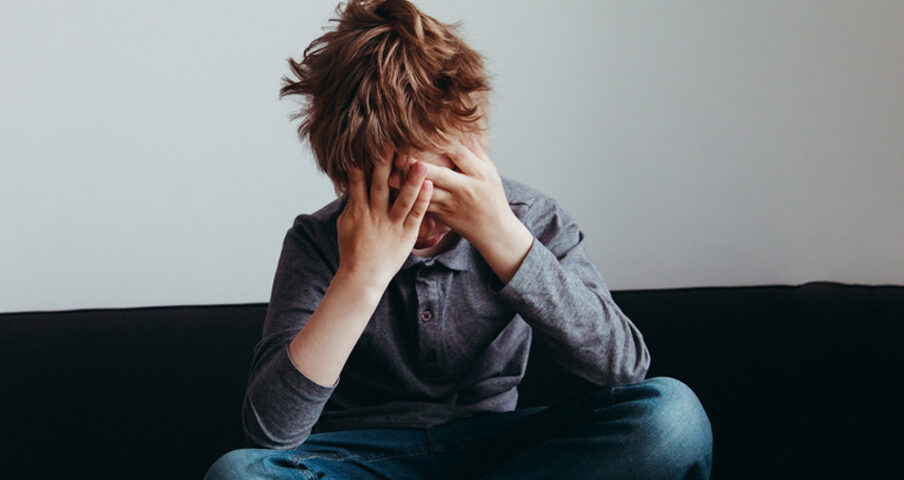
20 Attitudes to Deal with Problems in Life and at Work
September 25, 2021
5 Steps to Improve Your Productivity and Achieve Your Goals
October 28, 2021We mistakenly think that stress or anxiety is only something for adults; however, currently there are multiple reasons why your children might feel anxiety. The divorce of their parents, a bully in the friend circle, and separation from their parents, change of school or home etc. can cause stress disorder in children.
This is where the following question arises – How to detect that our children suffer from stress or anxiety? You will find the answer here, but changes in the appetite and trouble in sleeping are some of the most common effects.
Stress in your children can be very worrying, since this can generate other more complex problems, which, over time, can become even more serious. You need to act appropriately, otherwise; the stress suffered today, can transform into disorders in the future.
Stress is sometimes related to specific problems, which affect more children on a daily basis, and many of them are related to learning and attention.
Situations that can cause anxiety or stress in our children
You must bear in mind that your children have their own experiences and feelings. Therefore, various situations can cause stress in children. For them, in adverse moments they can have a world of responses and stimuli, but for us this can be something anecdotal.
Family changes, extracurricular activities, school, visits to the dentist or relationships with their peers can cause them concerns. You can put yourself in their situation without minimizing or putting down their feelings, you can promote their well-being and confidence.
Learn to identify the signs of stress in children
The child eats too much or little, has trouble sleeping , an exaggerated decrease or increase in physical exercise, poor performance in school, apathy, tiredness, fatigue, sadness, relationship problems or irritability, these are signs that when combined with change events can generate a pretty serious stress picture.
Through crying, continuous irritability, loss of appetite or defying being in Mom’s arms are always manifestations of feelings of stress; when children are quite young.
Occasionally, exaggerated fears of costumed characters or nightmares can occur due to the dark, sometimes separation can also cause anxiety. Difficulty speaking or stuttering, thumb sucking, or nocturnal enuresis (a very childish behaviour for his age) are clear signs of concern.
As children continue to develop, they tend to be more irritable or crying appears for no reason. If they continue to be stressed, they will be more aggressive than normal, behaving to attract the attention of their parents, in addition to physical discomfort or pain.
Later, in preadolescence or adolescence, they tend to develop better their rationale regarding what stress and anxiety mean, however, they cannot identify their reactions and begin to suffer emotional and behavioural alterations.
Common scenarios of stress in children
It is quite convenient to know how, when and where stress scenarios develop. In general, when your children are younger the stressful scenarios have to do with the school itself or the family situation. During preadolescence and adolescence, they are more predisposed due to a change in personal relationships.
Family and school
The family situation such as the divorce of the couple, the birth of a brother, changes of address, death of loved ones or problems in the work situation of their parents. On the other hand, at school there is annoyance or harassment of others, non-acceptance of peers, excessive school demands, change of school, conflicts or poor grades.
Health
One of the main sources of stress in children is illness and pain; being the most important stressor in children, hospitalization due to a chronic disease.
Fortunately, stressful situations are usually temporary, related to a medical check-up, a trip, high after-school load, etc. However, the consequences can be very serious when these situations extend over time.
That is why it is essential to avoid minimizing the consequences of stress and anxiety, since it has also been associated with an increase in asthma attacks or mental disorders are generated in adulthood.
At what point to seek help from a professional!
Sometimes it is quite normal for your children to have concerns. However, when anxiety intensifies and interferes negatively in family relationships or in their school development, your child probably requires the support of a professional and that is why the most advisable thing would be to consult immediately.
How to ensure that the stress of the parents does not affect the child
Stress in children can have multiple consequences, whether of a physical, cognitive and emotional origin. That is why certain disciplines such as mindfulness are fundamental tools to rehabilitate and recover their cognitive functions, in addition to regulating their emotional state through mindfulness.
It is essential to support the little ones so that our stress does not affect them, however, stress is also part of their development, but normalized. That is why mindfulness and meditation are practices that serve as support to repair the physical health and mental balance of your children.
In addition, it is important as parents to observe their behavior, trying to keep their rest intact, promote bonds of trust and control good nutrition.
In general, when the symptoms of stress and anxiety spread in the child and are affecting their health, it will be essential to turn to a specialist, this is because some physical factors are possibly involved. Neglecting each of these symptoms would not be convenient for the child.
Therefore, when the child can understand, it is necessary to talk to him and let him express himself and ask him questions about his feelings. By understanding what has been the origin of the problem in the child, it will be easier to overcome and control anxiety.


